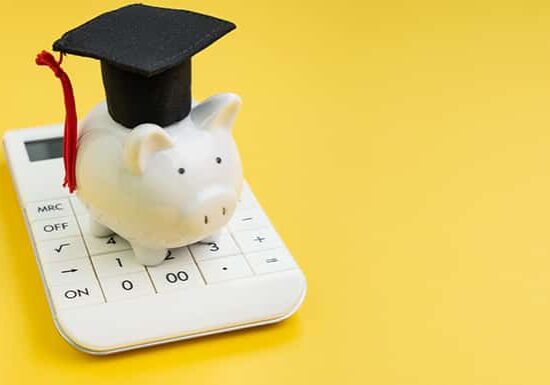Financial Education Services and Why It’s Important
Updated: June 19, 2024
Published: May 18, 2021

Financial education and/or financial literacy is important for everyone, no matter how much money you have. Learning how to manage your finances — whether it’s budgeting, saving, or investing — can help you make good choices and secure not just your future, but the future of your children (if you have them or you’re planning to). Unfortunately, financial literacy isn’t widely taught or discussed in our society, though there have been efforts in recent years to prioritize these conversations.
What is Financial Literacy?
Financial literacy is when people are given the knowledge, tools, and resources to manage money and make sound financial decisions on how to manage money most effectively.
Someone who is financially literate is confident with their financial decisions, and can demonstrate that literacy by their current financial situation or their journey towards a better financial situation. Likewise, someone who is not able to do this effectively is considered financially illiterate.
Budgeting
Budget is one of the pillars of financial literacy. Being able to budget for your own personal finances and your household/family’s finances is one of the most basic aspects of having strong finances. Budgeting will look different for every person based on your income, expenses, needs, and wants — and being able to manage your needs and your wants is part of budgeting, too.
Saving
Saving money is another element of financial literacy, but unfortunately, not everyone is able to do it all the time. When you create your budget, you should always set aside some savings as much as possible because you never know when you’ll need it for a rainy day. Your savings could go towards a down payment on a house, a trip you want to go on, or something you want to buy. Being financially literate means being able to allocate an appropriate amount of money towards savings.
Emergencies
Emergencies and savings may sometimes go hand in hand, but there is a bit of a difference. Savings may sometimes end up being for emergencies, but many financially literate people will have one account for savings and one for emergencies. According to the Federal Reserve’s “Report on the Economic Well-Being of U.S. Households in 2018”, “…many adults are financially vulnerable and would have difficulty handling an emergency expense as small as $400.”
Having money put aside for emergencies is essential. You never know if you’ll be laid off from your job, if there could be a medical emergency, or you’ll have to lend money to someone in need.
Investing
Investing is a higher level of financial literacy, but anyone can invest if you put the time into understanding how it works. There are so many ways to invest your money and get a return on that investment, whether it be in real estate, a 401(k), a Roth IRA, or stocks. But, as investing can be a little more complicated, make sure you educate yourself.
Planning for Retirement
Retirement is connected with investing and savings. There are many different ways to go about preparing for retirement, and the more financially literate you are, the more you can be creative and smart about how you go about preparing for when you want to stop working but have enough money to last you. In fact, there’s one movement called the F.I.R.E (Financial Independence, Retire Early) movement, which many millennials are getting into. F.I.R.E has the goal of retiring in their 30s or 40s instead of the traditional 65.
Understanding Credit/Managing Debt
Another aspect of financial literacy is understanding how credit works, interest rates, managing debts, paying off debts, etc. Credit is what’s needed if you ever want to buy a house, a car, take out a loan, or get a credit card. But building credit can take time, dedication, education, and persistence.
Furthermore, understanding that sometimes having some debts is okay, but making sure you don’t have to take out debt at a high interest rate or with repayment terms that will get you into further debt, is also important to comprehend.
- Image by Firmbee from Pixabay
Why Financial Literacy is Important
Financial literacy is important because it helps people to manage their money confidently. Managing money means being able to allocate money to savings, emergencies, and paying off debt. This comes with being able to budget your money in a smart way.
Those who continue learning about financial literacy and applying to their lives will be able to eventually make money with their money, or in other words, invest their money in ‘rewarding’ ventures.
Why Understanding Credit is Important to Your Financial Literacy
When we talk about financial education, one word that comes up a lot is “credit.” What is credit, exactly?
According to Experian, “Credit is the ability to borrow money or access goods or services with the understanding that you’ll pay later.” There are many different examples of credit.
For instance, you can get a credit card. The better your credit, the higher your credit will be, and at a better interest rate. If you get a lot of promotional credit card offers in the mail, that’s usually because your credit is good (although, there are cases when people who have bad credit will be taken advantage of by certain debt repayment/credit repair companies, but these companies can sometimes help, too). It’s a bit of a conundrum because one of the ways to build credit and get a credit card is to use a credit card responsibility, and make your payments on time.
But there are other ways to build credit, too. Paying bills on time and making sure that you don’t incur late fees is another way. The more credit you build, and the more responsible you are with that credit (for instance, not maxing out your credit cards), the more you’ll be able to use that credit to your advantage. Your credit score and your credit report is what people look at if you need to take out a student loan, want to finance a car, or even take out a mortgage for a home. You can check your credit score online for free in many cases, too!
How to Build Financial Literacy
Learning about how to build your credit is one way to start actually building financial literacy. Building financial literacy means learning about it and continuing to build on what you’ve learned as you gain more knowledge.
Here are some tips you can follow to start building financial literacy:
- Read books and articles and/or watch videos about financial literacy or that inspire financial literacy.
- Utilize tools at your bank or credit union. Many have resources or online calculators to help you budget, maximize your credit, and pay off debt accordingly.
- Download apps like Mint that can help you track your spending. Many banks have these apps, too.
- Other apps like Acorns can help you start investing.
- Meet with a financial planner at a bank to help you determine where to invest your money.
How Many People Are Financially Literate?
When we look at reading literacy rates, it’s a bit easier to get statistics. But when it comes to financial literacy, it’s a bit harder to quantify and not as binary as can you read/not read. How do you measure whether or not someone is financially literate?
According to Dave Ramsey, there is a test for financial literacy called the National Financial Capability Test that’s given by the National Financial Educators Council (NFEC). Less than half of the 17,000 participants were able to pass this 30-question test.
Do You Think You Are Financially Literate?
Want to know if you are financially literate? Then you can take the National Financial Capability Test yourself! In addition to this test, the NFEC offers many other surveys and quizzes to assess your financial literacy and see where you can improve on.
Of course, financial literacy is your own assessment of yourself, too. As long as you’re working towards constantly improving yourself and your understanding of personal finance, then you can say that you have at least some degree of financial literacy!
- Photo by olia danilevich from Pexels
What Steps Can You Take?
In order to improve your financial literacy and your finances overall, there are many action steps that you can take.
Record Your Expenses
Start with big expenses/debts that you pay every month, and try to keep a spreadsheet to understand smaller expenses, like what you spend on groceries or eating out at restaurants.
Establish Your Goals
What are you hoping to accomplish? Do you want to tackle some debt, save for a down payment, or both? Writing down your goals can help you plan better.
Determine How You Can Save
Don’t focus on little things that you enjoy treating yourself to every once in a while. Instead, focus on areas that could really see savings long-term.
Automate Payments
If you notice that you have an issue of remembering when to pay bills, automate your payments so that you don’t risk forgetting and having to pay late fees.
Pay Off Debt
What has the highest interest rates? What needs to be paid off now? What’s costing you the most money every month? Talking to a financial advisor can help you plan this out.
Set Savings Goals
How long will it take you to save up what you want to save? Having something to look forward to can help make those goals more attainable.
- Photo by Karolina Grabowska from Pexels
Financial Literacy and Higher Education
One major consideration in financial education is whether or not you should pay to go to college. Seeking a higher education degree can be a hard decision when you take into account how much tuition costs at universities around the world. You’ll have to think long and hard about your prospective major and how much you can expect to earn for your salary in relation to how much school costs.
But what if there was an option to earn your degree, without cost being a factor? The University of the People (UoPeople) is the first nonprofit, accredited institution of higher education in the United States that’s tuition-free. This means you can earn your degree without having to worry about paying for it, while still getting the credentials needed to get a good job.



